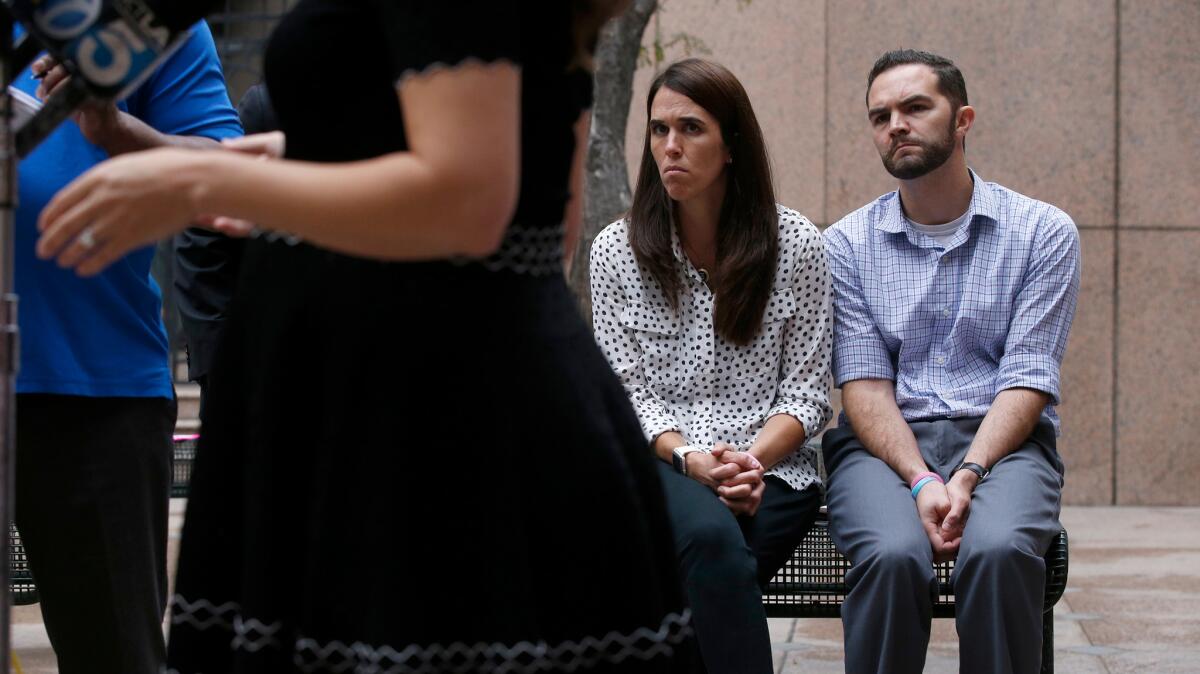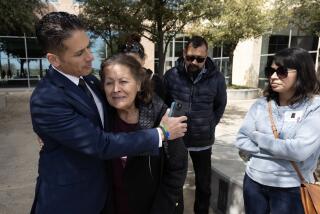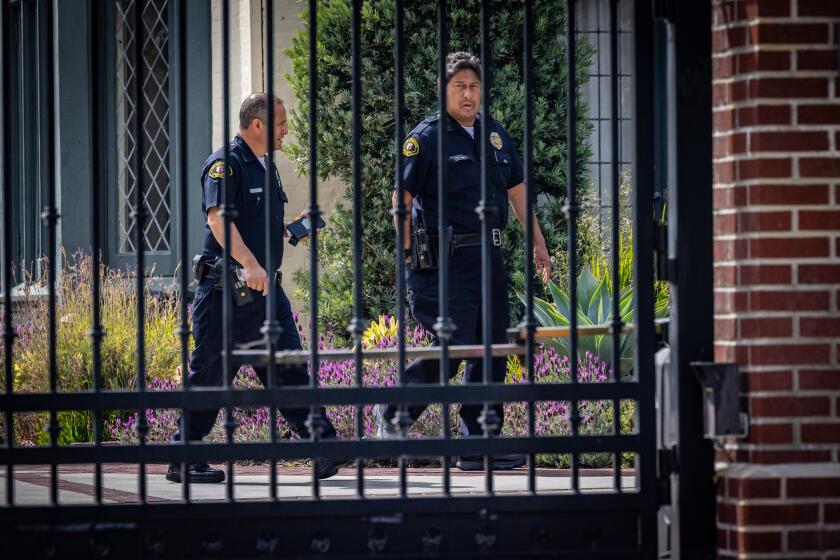Appellate court hears Santa Clarita family’s appeal in tribal custody case

The best interests of a 6-year-old Native American girl who was removed from her longtime foster parents in Santa Clarita earlier this year were debated by attorneys Friday during oral arguments in a state appellate court.
A three-judge panel of the 2nd District Court of Appeal in downtown Los Angeles heard the complicated details of the lengthy tribal custody case that has garnered international attention.
In March, Los Angeles County social workers, carrying out a court order, removed the child from foster parents Rusty and Summer Page before a bevy of weeping protesters and news cameras so she could be relocated to live with extended family members in Utah.
Because the girl is 1/64th Choctaw and her father is an enrolled member of the Oklahoma-based tribe, the federal Indian Child Welfare Act — intended to limit the breakup of Native American families through adoption or foster care placement — applies to her case.
The Pages have fought the girl’s removal, and she remained with them and their three children for years as appeals dragged on and as the California appeals court identified mistakes by the lower courts.
At question in the case is whether the amount of time in which the young girl has lived with and bonded with her foster family — more than four years — has made removal so traumatic for her that she should stay with them.
On Friday, Presiding Justice Paul Turner said the foster family did not object to hearing dates and delays while the girl was in their care because she got to stay with them during that time.
“They did this because they thought that this was right, because they love the child,” Turner said.
The girl went to live with the Page family in December 2011, around the time the eventual caregivers emerged, according to court documents. Her father, who has an extensive criminal background, discontinued efforts to regain custody in 2012, and social workers initiated work to transfer her to Utah, court records show.
The Choctaw tribe preferred the Utah family for placement for the girl partly because a sibling lives in the home and another lives nearby.
Lori Alvino McGill, the Pages’ attorney, told the judges Friday that the girl had flourished under her clients’ care and that it was in her best interest for her to stay with them.
“It’s utterly undisputed that this child has viewed these people as her parents and this family as her own,” Alvino McGill said. “She became a person with an entire world and relationships that this court cannot ignore.”
Christopher Blake, a court-appointed attorney representing the child, said the Pages “knew full well” that if reunification with the girl’s father failed then she would be placed with her out-of-state relatives.
The girl, Blake said, “has always known she was a foster child” and had regular visits and Skype conversations with the Utah family. An expert agreed upon by all parties determined that she was capable of making the transfer, he said.
The long-term benefits of placement with her extended relatives “far outweigh” the difficulty of moving her, Blake said.
The girl has been “doing well” in Utah, he said.
Kim Nemoy, an attorney representing the L.A. County Department of Children and Family Services, said the girl only stayed and bonded with the Pages for so long only because of ongoing litigation and that she could have been moved much sooner.
“We told them repeatedly, ‘This child is in your temporary care,’” Nemoy said of the Pages.
The extended relatives are not Native American, but her siblings are and can pass on their story and heritage to the child, said Melissa Middleton, an attorney for the Choctaw tribe.
The girl, Middleton said, is a citizen of the Choctaw Nation and “has a right to learn what it means to her to be a Choctaw.”
A decision in the case is expected within the next 60 days, according to Alvino McGill. The Pages, she said, are prepared to fight all the way to the U.S. Supreme Court if they have to.
Speaking to reporters outside the L.A. courtroom, Rusty Page said he and his family have not had any contact with the girl since her removal.
“We repeatedly asked to speak with [her] and have been cruelly denied,” Page said. “Why? Because we spoke out. Because we promised [her] we would fight with everything we could to bring her home.”
For 81 days, he said, the girl “has missed being tucked into bed by mommy and me. ... She has missed my butterfly kisses after bedtime prayers and silly best wishes for the days to come.”
With news cameras watching, Page cried as he spoke.
ALSO
Transgender woman is shot in Santa Ana
L.A. looks to amend city ordinance to allow transgender bathroom access at parks
Here are 9 things you should know about the Stanford sex assault case
Twitter: @haileybranson
More to Read
Start your day right
Sign up for Essential California for news, features and recommendations from the L.A. Times and beyond in your inbox six days a week.
You may occasionally receive promotional content from the Los Angeles Times.







